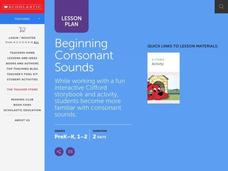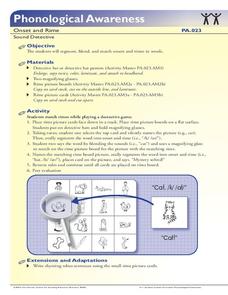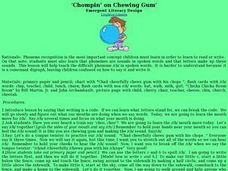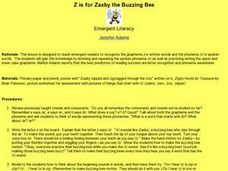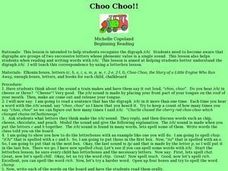Curated OER
Beginning Consonant Sounds
Young readers practice their beginning consonant sounds. Solid worksheets prompt students to practice their consonant in fun ways. These worksheets use Clifford the Big Red Dog as a theme, and give the kids excellent and colorful practice.
Curriculum Corner
Digraph Word Hunt
Support young learners with developing their spelling skills and ready fluency with this simple graphic organizer. Focusing on the four consonant digraphs /th/, /ch/, /sh/, and /wh/, students dig through their independent reading books...
Houghton Mifflin Harcourt
We’re a Family: Extra Support Lessons (Theme 3)
Pay special attention to onsets and rimes and initial consonants with this packet of activities designed to provide additional support to youngsters just learning to read and write.
Curated OER
Beginner's Guide to Arabic
Introduce your language learners to Arabic. The most useful portion of this resource is the detailed information on the Arabic alphabet. Each letter is placed in a grid that shows the various ways to write it based on the situation...
Florida Center for Reading Research
Picture Slide
Here is another fun and engaging way to help youngsters build phonological awareness. In pairs, they use the provided picture cards to sound out segments of words. As they slide the picture together they say a segment of the...
Florida Center for Reading Research
Phonics: Onset and Rime, Say It Now
Pairs use onset and rime cards to make as many words as possible by blending the onsets with the rimes.
Florida Center for Reading Research
Phonological Awareness: Onset and Rime, Sound Detective
Play letter sound detective with your class, and snoop out sounds, onsets, blends, and rhyme. In pairs, children take turns choosing a card from the pile; as they sound out part of the word, their partner attempts to figure out which...
Kiddy House
Snail
S is for snail. Use this worksheet to help your young readers learn the letter s. This simple coloring worksheet is great for youngsters who are learning the beginning letter s sound. They can practice saying the s sound and coloring...
Curated OER
Clifford Phonics Fun
Students develop phonemic awareness skills. They recognize consonant sound spellings and distinguish easily confused letter pairs. Students examine common short and long vowel sound spellings. They read stories containing high frequency...
Achieve3000
Discriminating Phonemes
Develop the fluency of beginning readers one sound at a time with this phonemic awareness lesson. Through a series of whole-class instruction, independent practice, and collaborative learning activities, children practice identifying the...
Houghton Mifflin Harcourt
The Tell-Tale Heart
Here's the perfect resource for anyone using Edgar Allan Poe's famous short story the "Tell-Tale Heart." The packet includes five worksheets that provide skills practice exercises focusing on spelling with consonant blends, words with...
Florida Center for Reading Research
Phoneme Split and Say
Little ones are provided with all the tools needed to begin segmenting phonemes. There are twenty Elkonin box picture cards, five blank Elkonin box cards, and full instructions on how to help pre-readers practice splitting and saying...
Curated OER
Chompin' on Chewing Gum
Students complete a variety of activities related to the /ch/ consonant digraph. As a class they recite a Ch tongue twister, then trace and write the letters ch. Students then listen to word pairs and identify the words containing the...
Curated OER
Swat The Spot
Students practice beginning letter/sound association. In this beginning letter/sound lesson, students listen to a reading of Potluck by Anne Shelby while identifying the sounds that are associated with the beginning letters of words in...
Poetry4kids
How to Write an Alliteration Poem
Learners follow five steps to compose an alliteration poem. They choose one consonant and brainstorm as many nouns, verbs, and adjectives they can think of to create rhyming sentences that come together in a poetic fashion.
Florida Center for Reading Research
Phonological Awareness - Phoneme Segmenting and Blending, Treasure Chest
Working in pairs, scholars use picture cards to practice segmenting words into phonemes and blending phonemes into words. When a peer answers correctly they place a penny in a treasure chest. Incorrect responses make the card go back in...
Curated OER
A Model Lesson Plan for Teaching Phonics
First graders decode words containing the letter o when it is followed by a consonant and silent e.
Curated OER
I Say You Say
Students practice switching initial consonant sounds to make rhyming words. They identify the difference between rhyming words is in the initial sound. Students practice various rhyming phrases and create their own rhyming pairs.
Curated OER
Z is for Zaxby the Buzzing Bee
Students complete a variety of activities related to the /z/ phoneme. As a class they listen to word pairs and identify the word containing the /z/ sound, then recite a z tongue twister. Students trace and write the letter z and listen...
Curated OER
Choo, Choo!
Students complete a variety of activities related to the /ch/ digraph. As a class they recite a tongue twister, and write the letters Ch. Students listen to word pairs and identify which word in each pair contains the /ch/ sound, and...
Curated OER
BL to the Ends (blends)
Students examine word blends. For this word blends lesson, students investigate common word blends. Working in pairs, students analyze words containing blends and generate a word list.
Curated OER
Write Your Own Poem Letter R
In this word blends worksheet, students use one of the given blends to make up rhyming pairs. Students use the pairs to make silly sentences and a rhyming poem. Students think of other rhyming words for their poem.
Curated OER
Double Jeopardy-Homophones
Second graders identify homophones as words that sound alike but have different meanings. They, given a pair of homophones, are to explain the meanings of the words using gestures, role playing, or drawing a picture with their partner.
Curated OER
Phonology: The Sound Patterns of Language
Use this straightforward and informative phonology presentation in your speech and language class. Addressing the finer points of phonetics such as palatization and consonant assimilation, this is a great way to provide your students...


